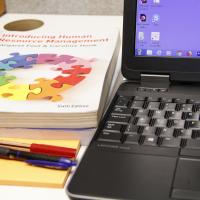
Exam Tips
Preparing for exams
The following suggestions are offered to reduce stress and allow you to prepare effectively and perform well in exams.
Exam season can be challenging and stress-inducing for many students. The exam hall, time pressure and a fear of forgetting everything you know just when you need it, can bring on cold sweats and a sense of panic. It is easy to lose perspective and begin to feel your whole future depends on how you perform over the hour or two of an exam but this is not usually the case.
A healthy appreciation of the importance of preparing for exams and giving it your best effort is a good thing, but very high-stress levels can get in the way and usually do nothing to enhance performance. Every student will have a different approach to revision, exam preparation and sitting exams and each will respond differently to suggestions. For this reason, the following is offered as a toolkit which contains a variety of ideas, tips and suggestions that you may find useful.
Jump to each section of the page:
Study support
We want you to get the most from your course so you can reach your full potential. We offer a range of study support services to help you with your studies.
Before the exam
-
Remember that there is a difference between learning and revising.
Plan your revision time carefully and start early if you can.
If you still need to learn content try to factor in extra time to your schedule. You need to learn the content before you can revise it.
-
Take breaks when you revise.
It is easy to put pressure on yourself to keep working when you feel tired. Taking regular breaks during revision gives the brain a higher chance of remembering what you’ve crammed into it. Try 50 minutes on, 10 minutes off. Try to do something entirely different for at least a couple of hours each day or evening.
-
Having a flexible approach will help you stick to what you have planned.
If you ever have an “accidental lie-in” don’t let that become a wasted day. Readjust and keep focused for the rest of the day so that you get back on track.
-
Prepare revision sessions.
Pay attention to topics that come up in revision sessions and focus on these during your revision.
-
Try looking at past papers if your teachers or department gives access to them.
They are useful for seeing what questions have come up before and familiarise yourself with the format of the exam paper, to help you plan your time.
-
Explain what you’ve been learning/revising with a fellow coursemate, another student, family member or friend.
This will help to consolidate what you’ve been learning into knowledge you can use in an exam. If you can talk about a topic you will usually be able to write confidently about it when answering a question about it in the exam.
-
Don't cram before an exam.
Try not to cram just before an exam starts as it can be hard to retain information at the last minute and it can be overwhelming.
-
Remember to prepare for the exam day carefully.
Plan travel allowing for any unexpected delays and ensure you have your university ID pass, keys or rail tickets, pens, water and any other items you are expected to bring to the exam, ready in advance.
During the exam
-
Create an exam brief plan.
In the exam, if you are asked to write an essay, take time to create a brief plan before starting to write your answer.
-
Remember to read the exam instructions and the exam questions carefully.
It is easy to rush when time is limited and misread what you have been asked to do or the keywords in the question. Not doing this can lead you to write a good answer but not one that is relevant to the actual questions asked.
-
Think about how you need to divide your time, depending on the demands of each exam.
Two answers in two hours is quite straight forward, and you would usually give an hour to each answer, but exams vary and this can impact on how you need to divide your time.
-
Remember that your teacher, tutors or lecturers want you to do well and want to give you marks.
Exams are there to give you an opportunity to demonstrate your knowledge. For this reason, if you have time, it is always worth attempting an answer rather than leaving sections blank. It is also worth indicating how you would have answered if you are running out of time.
-
If an exam asks for 2 essays during an exam avoid spending all your time on one answer and neglect the other.
If you only attempt one of the 2 essays requested you would automatically lose 50% of the marks. While it is common to feel one answer is stronger than the other it is important to try to attempt both as well as you can.
-
Stay calm during exams.
If you do get stressed during an exam try to calm yourself by taking a moment to focus on your breathing and take a few deep breaths.
-
Always try to proofread your work before the end of an exam and ensure that it can be read easily.
Make sure you have included any information that has been requested such as student ID number or which question numbers you answered, where there was a choice.
After the exam
-
After exams try not to discuss your answers or compare them with others.
It is a good idea to try to leave the exam in the exam hall and move on to focus on the next exam or challenge.
-
Reward yourself.
Remember to reward yourself after your exams and for all your work during revision.







